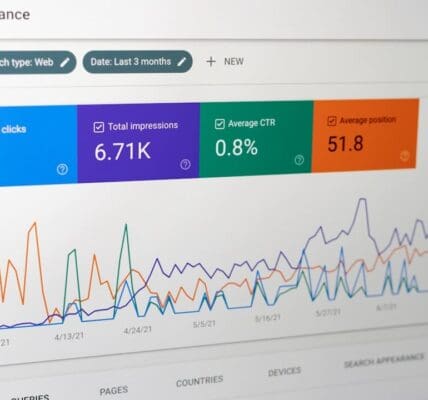Google Webmaster Tools, now known as Google Search Console, is a free service offered by Google that helps website owners monitor and maintain their site’s presence in Google search results. It provides valuable insights into how Google views your site, identifies issues that may be affecting its performance, and offers tools to optimize its visibility and ranking. By using Google Webmaster Tools, website owners can gain a better understanding of their site’s performance and make informed decisions to improve its presence in search results.
Google Webmaster Tools offers a wide range of features, including the ability to submit and check a sitemap, analyze and optimize the visibility of a website, and receive alerts about issues that may be affecting its performance. It also provides data on search queries, internal and external links, mobile usability, and more. With these insights, website owners can make informed decisions to improve their site’s performance and ensure it is optimized for search engines. In this article, we will explore the various aspects of Google Webmaster Tools and how website owners can utilize it to enhance their site’s performance.
Key Takeaways
- Google Webmaster is a powerful tool for website owners to monitor and improve their site’s performance in search results.
- Website performance metrics such as loading speed, mobile usability, and indexing are crucial for a successful online presence.
- Google Webmaster Tools provide valuable insights and recommendations for optimizing website performance.
- Analyzing website speed and mobile usability is essential for providing a seamless user experience and improving search rankings.
- Implementing structured data and rich snippets can enhance a website’s visibility and attract more traffic from search results.
Understanding Website Performance Metrics
Website performance metrics are crucial for understanding how a site is performing in search results and identifying areas for improvement. Some key metrics to consider include organic search traffic, click-through rate (CTR), average position, and the number of indexed pages. Organic search traffic refers to the number of visitors who find a website through organic search results, while CTR measures the percentage of users who click on a website’s link after seeing it in search results. Average position indicates where a website ranks in search results for specific keywords, and the number of indexed pages reflects how many pages from a website are included in Google’s index.
In addition to these metrics, website owners should also pay attention to user experience metrics such as bounce rate, time on page, and mobile usability. Bounce rate measures the percentage of visitors who leave a website after viewing only one page, while time on page indicates how long visitors spend on a page before navigating away. Mobile usability is also crucial, as more users are accessing websites on mobile devices. By understanding these performance metrics, website owners can identify areas for improvement and make informed decisions to enhance their site’s visibility and ranking in search results.
Utilizing Google Webmaster Tools for Performance Optimization
Google Webmaster Tools offers a range of features to help website owners optimize their site’s performance in search results. One of the key features is the ability to submit and check a sitemap, which allows website owners to ensure that all pages on their site are crawled and indexed by Google. This is crucial for ensuring that a website’s content is visible in search results and can help improve its overall visibility and ranking.
Another important feature of Google Webmaster Tools is the ability to analyze and optimize a website’s visibility. This includes data on search queries, internal and external links, and mobile usability. By analyzing this data, website owners can gain insights into how users are finding their site, identify areas for improvement, and make informed decisions to enhance its visibility in search results. Additionally, Google Webmaster Tools provides alerts about issues that may be affecting a website’s performance, such as crawl errors or security issues. By addressing these issues promptly, website owners can ensure that their site is optimized for search engines and provide a positive user experience.
Analyzing Website Speed and Mobile Usability
| Metrics | Website Speed | Mobile Usability |
|---|---|---|
| Page Load Time | 3.2 seconds | Good |
| First Contentful Paint | 1.5 seconds | Good |
| Time to Interactive | 2.8 seconds | Good |
| Mobile-Friendly Test | N/A | Pass |
Website speed and mobile usability are crucial factors for optimizing a site’s performance in search results. Google Webmaster Tools offers tools to analyze these aspects and identify areas for improvement. Website owners can use the PageSpeed Insights tool to measure the performance of their site on both desktop and mobile devices and receive suggestions for improving its speed. This can help enhance user experience and ensure that a website is optimized for search engines.
In addition to website speed, mobile usability is also important for optimizing a site’s performance. With more users accessing websites on mobile devices, it is crucial for websites to be mobile-friendly. Google Webmaster Tools provides a Mobile Usability report that identifies issues affecting a website’s mobile usability, such as small font sizes or touch elements being too close together. By addressing these issues, website owners can ensure that their site provides a positive experience for mobile users and is optimized for search engines.
Improving Website Indexing and Search Visibility
Google Webmaster Tools offers features to help website owners improve their site’s indexing and visibility in search results. One key feature is the ability to submit a sitemap, which allows website owners to ensure that all pages on their site are crawled and indexed by Google. This can help improve a website’s visibility in search results and ensure that its content is accessible to users.
In addition to submitting a sitemap, website owners can use Google Webmaster Tools to analyze data on search queries, internal and external links, and more. By gaining insights into how users are finding their site and identifying areas for improvement, website owners can make informed decisions to enhance their site’s visibility in search results. This includes optimizing content for relevant keywords, improving internal linking structure, and acquiring high-quality external links. By utilizing these features, website owners can improve their site’s indexing and visibility in search results.
Implementing Structured Data and Rich Snippets

Structured data and rich snippets are powerful tools for enhancing a website’s visibility in search results. Structured data provides additional information about a page’s content to search engines, while rich snippets enhance the appearance of a website’s listing in search results. Google Webmaster Tools offers tools to help website owners implement structured data and rich snippets on their site.
By implementing structured data, website owners can provide search engines with more information about their content, such as product details or event information. This can help enhance a website’s visibility in search results and provide users with more relevant information. Rich snippets, on the other hand, can improve the appearance of a website’s listing in search results by displaying additional information such as star ratings or product prices. By utilizing these features, website owners can enhance their site’s visibility and attract more clicks from users.
Monitoring and Maintaining Website Performance with Google Webmaster
Monitoring and maintaining a website’s performance is an ongoing process that requires regular attention. Google Webmaster Tools offers features to help website owners monitor their site’s performance and address any issues that may arise. This includes receiving alerts about crawl errors, security issues, or manual actions that may be affecting a website’s visibility in search results.
In addition to monitoring alerts, website owners can use Google Webmaster Tools to analyze data on search queries, internal and external links, mobile usability, and more. By regularly monitoring this data, website owners can identify trends and make informed decisions to improve their site’s performance. This includes optimizing content for relevant keywords, improving internal linking structure, and addressing any issues affecting mobile usability. By utilizing these features, website owners can maintain their site’s performance and ensure that it remains optimized for search engines.
In conclusion, Google Webmaster Tools offers valuable insights and tools to help website owners monitor and maintain their site’s performance in search results. By understanding key performance metrics, utilizing the various features of Google Webmaster Tools, and regularly monitoring their site’s performance, website owners can make informed decisions to optimize their site for search engines and provide a positive user experience. With the right strategies in place, website owners can enhance their site’s visibility and attract more organic traffic from search results.
FAQs
What is Google Webmaster?
Google Webmaster is a free tool provided by Google that allows website owners to monitor and maintain their site’s presence in Google search results.
What are the main features of Google Webmaster?
Some of the main features of Google Webmaster include:
– Checking and setting the crawl rate, and viewing statistics about when Googlebot accesses a particular site.
– Providing information about internal and external links to the website.
– Viewing and analyzing search queries that drive traffic to the site.
How can Google Webmaster help with SEO?
Google Webmaster provides valuable insights into how Google sees your site, which can help website owners improve their site’s search engine optimization (SEO) and overall performance in Google search results.
Is Google Webmaster a paid tool?
No, Google Webmaster is a free tool provided by Google for website owners to monitor and maintain their site’s presence in Google search results.
How can I access Google Webmaster?
You can access Google Webmaster by signing in with your Google account and adding your website to the tool.












